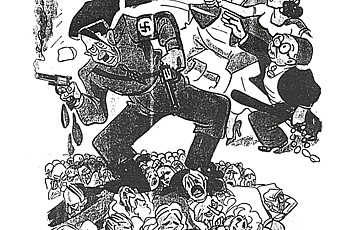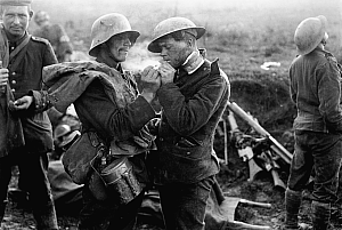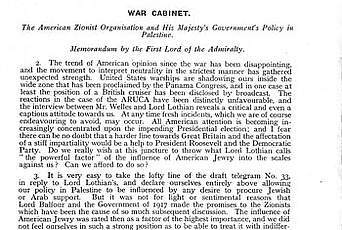Does Propaganda Incite Violence?

Over the last ten years, national and international courts have prosecuted a greater number of political leaders and their propagandists who incite others to commit acts of war, terrorism, and genocide. The United States government, a self-avowed promoter of freedom of speech, has pursued al-Qaeda propagandists such as Ali al-Bahlul and Sulaiman Abu Ghaith, and in 2014 a federal court sentenced Ghaith to life in prison for what his defense attorney called “just talk.” The International Criminal Tribunal for Rwanda has convicted eight defendants, including radio broadcasters and a Rwandan pop star, of direct and public incitement to commit genocide. Combatting election propaganda is a priority of the International Criminal Court’s chief prosecutor, Fatou Bensouda, who warned in advance of the recent Nigerian elections that “any person who incites or engages in acts of violence by ordering, requesting, encouraging, or contributing in any other manner to the commission of crimes … is liable to prosecution either by Nigerian courts or by ICC.”
Intuitively, we may feel that leaders and media figures who incite genocide and crimes against humanity should bear criminal responsibility. Yet there does not exist any conclusive body of social science evidence demonstrating that extreme speech directly influences attitudes and behavior. Anthropologists and political scientists interviewed hundreds of convicted perpetrators of the 1994 genocide in Rwanda, and they reported that peer pressure from male neighbors and kin influenced their decisions to participate in genocide more than government and radio propaganda. Of course, listeners are not always consciously aware of their motivations, and quantitative approaches have yielded divergent findings that identify the harmful effects of hate speech. Economist David Yanagizawa-Drott used an econometric analysis of prosecution rates and radio coverage and found that approximately ten percent of the participation in the Rwandan genocide can be attributed to radio broadcasts, corresponding to an estimated 50,000 murders.
These mixed findings justify the use of other social science methods to understand the phenomenon of inciting propaganda. We designed psychological and physiological studies to test the concrete effects of propaganda, drawing on the actual speeches of Vojislav Šešelj, a Serb political leader presently awaiting judgment in The Hague for instigating murder, torture, and deportation of Croat civilians in the early 1990s. Šešelj is not charged with committing material acts of murder or deportation, but the prosecution alleges that over nine hundred people died as a result of his public calls for the persecution of other ethnic groups. We obtained 242 of his public speeches during the time period of the indictment and coded them into eight sub-categories: calls for revenge, extreme nationalist sentiments, negative stereotyping of other groups, dehumanizing language, demands for justice, references to past atrocities, victimization of his own group, and warnings of a direct threat to his group.
As with much war propaganda, two of the most frequent types of speech Šešelj used were dehumanizing language and calls for revenge. Dehumanizing speeches referred to Croats as animals devoid of human qualities, for example: “We, Serbs, as a people, let a poisonous snake bite our heart three times after holding it in our arms. That poisonous snake, that’s the Croats…. Now we need to smash its head so it never bites anyone again.” The revenge speeches called for retribution on behalf of past victims: “But, if the Croats try to massacre us, the Serbs will not forgive nor forget. Our revenge will be horrific.… Those who survived have no right to forgive in the name of the slaughtered.”
Over four hundred participants from the United States read either one of the propagandistic speeches or a control speech. Subsequently, they were asked questions about their empathy for the in-group and the out-group, their perceptions of the intentions of the in-group and the out-group, and whether violence is ever morally justifiable. Some of the results we anticipated. All of the types of speech, with the exception of nationalism, reduced the propensity of the participants to empathize with the out-group. Nationalism, revenge, and warnings of a direct threat raised empathy levels for the in-group. Nationalism, revenge, negative stereotyping, dehumanization, and references to justice systems all elevated positive attitudes toward the in-group.
Other results were unexpected. Only revenge speech increased overall negative attitudes toward the out-group. Significantly, only the speeches that called for revenge and that referenced past atrocities led the participants to morally justify violence. Not only did revenge speech increase moral justifications of violence, but it also consolidated in-group identity to the same extent as highly nationalistic rhetoric. Dehumanizing speech, generally seen by criminal courts and experts as the most extreme form of hate speech, did not have the same effect on participants’ willingness to justify violence. Intriguingly, dehumanization speech increased participants’ belief that the aggressors are morally responsible for their acts, while revenge speech had exactly the opposite effect—they were judged as not morally responsible. We theorize that revenge speech disposes people to view the opposing group as lacking in any moral capacity, i.e., no longer made up of cognizant individuals capable of moral thought. This may explain intercommunal violence where aggressors turn against neighbors and colleagues with whom they had previously enjoyed close social bonds.
At the personality level, those who believe the world is not a just place, are more politically conservative, and engage more in violent media are more predisposed to justify violence. Male participants were more susceptible to the effects of propaganda than females. Further research is needed, as we were not able to examine the interactions among different types of speeches, nor were we able to ascertain the effects of repetition, one of the hallmarks of propaganda. We have just conducted the survey in Belgrade, Serbia, and are presently analyzing the similarities and differences between the U.S. and Serbian populations’ responses to inciting speech. The results of this comparison will provide insights into some of the variations between political communities that have distinct public cultures and histories of armed conflict.
The next question is, what is the mechanism through which denigrating and inciting speech influences the listener? We followed up our psychological study with a physiological experiment using facial electromyography, which measures emotional reactions through facial muscle activity. We utilized only the revenge and dehumanization speeches, and we expected that revenge speech would elicit anger and the dehumanization speech would elicit disgust, but our expectations were confounded. In response to the speeches calling for revenge, our participants showed physiological indicators of disgust rather than anger. Neither disgust nor anger registered in response to speech that dehumanized the out-group. This suggests that the response of “moral disgust” is central to understanding how revenge speech affects empathy and enhances justifications of violence.
What do these findings mean for the criminalization of propaganda for terrorist and extreme nationalist causes? First of all, the results tell us that propaganda has demonstrable conditioning effects that lead to greater in-group solidarity and opposition towards the out-group, as well as inculcating a greater tolerance toward violence against another population. These general findings do not determine whether a specific individual speaker incited particular listeners to commit certain crimes. However, they do indicate that certain types of speech will have probabilistic effects on a proportion of listeners. Specifically, they tell us that revenge speech is more likely to lead to violence than other forms of speech. Previous international criminal courts, as well as social scientists, have emphasized the role of dehumanizing propaganda during genocide; however, our results suggest that dehumanization may not be the most egregious form of inciting speech. Rather, prosecutors at international tribunals may be able to construct a more compelling case against political leaders inciting violence on the basis of revenge, since the causal link to subsequent violence is better supported by the evidence. Prevention of genocide has always been a weakness of the international system, and our findings could guide prosecutors regarding whom to indict, and when to indict, as part of a wider effort to forestall mass atrocities.
Ultimately, it is up to the courts to decide how they will judge the zealous advocates and recruiters for extreme and violent causes. The social science of inciting speech, however, is becoming more conclusive and may contribute to evidencebased policy-making at the national and international levels. It points toward the negative and damaging effects of revenge speech and can guide policy-makers and international prosecutors who attempt to restrain the propagandists of discriminatory hatred and violence.


